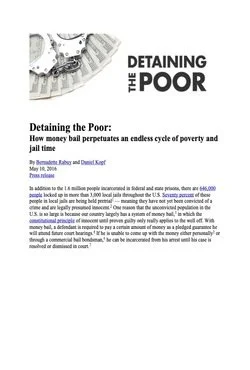Detaining the Poor: How money bail perpetuates an endless cycle of poverty and jail time
By Bernadette Rabuy and Daniel Kopf
In addition to the 1.6 million people incarcerated in federal and state prisons, there are more than 600,000 people locked up in more than 3,000 local jails throughout the U.S. Over 70 percent of these people in local jails are being held pretrial — meaning they have not yet been convicted of a crime and are legally presumed innocent.
One reason that the unconvicted population in the U.S. is so large is because our country largely has a system of money bail, in which the constitutional principle of innocent until proven guilty only really applies to the well off. With money bail, a defendant is required to pay a certain amount of money as a pledged guarantee that they will attend future court hearings. If the defendant is unable to come up with the money either personally or through a commercial bail bondsman, they can be incarcerated from their arrest until their case is resolved or dismissed in court.
Northampton, MA: Prison Policy Institute, 2016. 22p.


